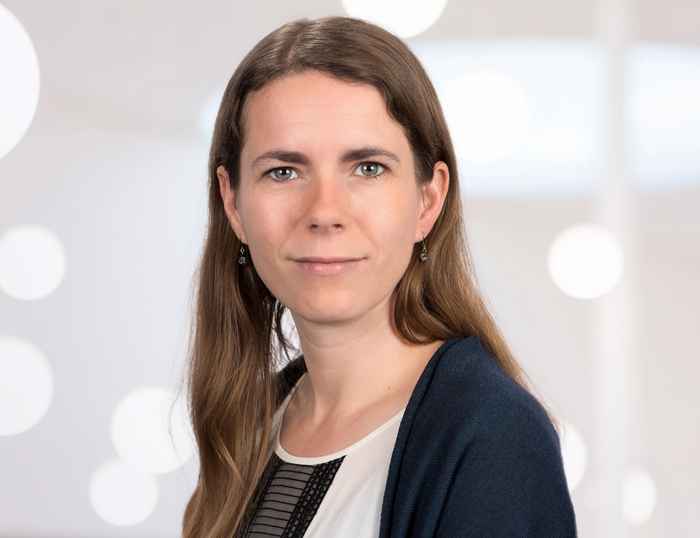Anna Berbers: 'I hope that my research results can also contribute to more awareness.'
14 July 2022

How do you feel about the UvA taking actively part in Pride Amsterdam again this year?
'I think that’s great. It is clear to me that the UvA is intrinsically motivated to be inclusive for LGBTQ+ people. In order to truly and fully be that, there are still a few steps that we need to take. Something that the Central Diversity Office (CDO) within the UvA als strives for. Looking at opportunities within my own ‘UvA bubble’, I see those for instance in terms of how we deal with statistical data, which is often still primarily based on a binary paradigm and therefore an incomplete reality in which only men and women exist. It simplifies the empirical reality. Don’t get me wrong: I’m not arguing or advocating for getting rid of biological sex as a given in research. However, as UvA academics we can also devote our attention to non-binary people as a category within our research, as well as focus more specifically on this group of people in studies.
The exclusion of non-binary people extends to technology: traditional software, programmes and systems that we use for all sorts of purposes within the UvA. One example of progress in this regard is that it is now possible to set and show your pronouns on Canvas. An absolute quick win for the UvA would be realising more gender-neutral lavatories on our campuses. Also, we can create more awareness among lecturers in relation to the presence of non-binary individuals in our society – and therefore in their tutorials. That awareness can lead to a more socially safe environment for them. These days, it’s standard practice for me to mention the pronouns I identify with and, therefore, want to be addressed with at the start of the first seminars. After I did so, I give my students the opportunity to do the same.'
How are you involved in the LGBTQ+ community?
'I’m a cisgender heterosexual woman who considers herself an ally of that community. I try to give substance to that in various ways, including by consciously choosing research themes and topics that could benefit that group and by making my way of teaching as comfortable as I can for anyone who is part of that group. As an independent researcher, I carry out research into how members of the LGBTQ+ community are viewed as the ‘other’ by society, the effects of that on how they are represented in the media and how organisations communicate about them, and the impact this all has on them. Unfortunately, in 2022 we still often see many types of representations and contents of communications that are linked to prejudices and stereotypes. This is also something I hear from LGBTQ+ respondents who I’ve interviewed. In addition to knowledge enrichment, I hope that the results of my research can contribute to creating more awareness in this regard.'
What does Pride mean to you? How do you see Pride?
'I see Pride as an annual celebration that allows us to reflect on the progress we have made with regard to the position of LGBTQ+ people in the West since the Stonewall riots in New York. To celebrate that they truly belong and can fully participate in society, and are valued and celebrated as a minority. Also, it’s a festive way to prepare for further improvements in term of their social position. So, I always see it as a time to reflect on developments – which either entail progress or regression – and to focus on improvements we envisage and must achieve. On top of that, it’s a tribute to the courageous LGBTQ+ people who fought for equal rights in the past. These days you see certain groups within the LGBTQ+ community that believe that there should be even more space for protest – in addition to the Pride Walk. Although Pride has always been a celebration and was conceived as such, in principle I’m in favour of adding some more activist elements to Pride week – without that going to the detriment of the original, celebratory identity of the event.'
This year’s theme ‘My Gender, My Pride’ means that for the first time, Pride Amsterdam will focus on gender identity instead of sexual orientation/diversity. How do you feel about that?
I think it sets a precedent that I regard as a positive development. Unfortunately, there is quite a lot of negativity in respect of this group worldwide – aimed both at non-binary people and transgender people. That’s precisely why I think it’s great that Pride Amsterdam is putting gender identity central this year.
During Pride, you will be giving a guest lecture on pinkwashing. What are we talking about exactly?
'In short, this refers to cases where an organisation’s communication does not match up with the behaviour or operational management of that organisation. For example, because they donate funds to a political party that does not support LGBTQ+ people because it advocates a reduction of their rights. In that sense, their words don’t match up to their actions.'
Where does your affinity with that phenomenon stem from?
'I’m very curious about how LGBTQ+ persons view statements of support from organisations. When do they consider it pinkwashing, based on what, and when don’t they? It might be good to mention the fact that pinkwashing does not necessarily have to relate to commercial organisations. It can, for example, equally relate to public-sector foundations or institutes.'
Can you give us a sneak peek of your talk?
First of all, I’ll briefly be going into the phenomenon that is pinkwashing, after which I’ll be presenting part of my ongoing research project that deals with this issue. I’ll then be delving deeper into how both cause-related marketing and corporate political advocacy are perceived by LGBTQ+ individuals. Both can be seen as pinkwashing. Finally, I hope to be answering questions from the audience.